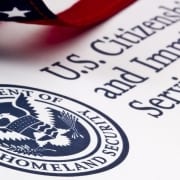New Public Charge Rule’s Impact on Green Card Applicants
Since February 24th, 2020, U.S. Citizenship and Immigration Services (USCIS) has implemented the Inadmissibility on Public Charge Grounds Final Rule nationwide. This public charge rule expands the grounds on which immigration enforcement officials can deny the acquisition of a green card or other legal status to noncitizen applicants, to ensure that individuals will not rely upon government benefits and services. Until February 24th, the use of most public benefits did not impede legal status in the United States. The new rules allow USCIS officials to penalize noncitizen recipients of housing, health, and nutrition welfare programs that are applying to change their legal status. However, because few benefit programs are open to noncitizens without legal permanent residence, few green card applicants are likely to be denied based on their benefit use. Notably, certain classes of individuals, such as refugees and asylum seekers, are exempt from the public charge ground of inadmissibility.
Note that Public Benefits that will not be considered by officers in determining an alien applicant’s inadmissibility on grounds of public charge are: emergency medical assistance, disaster relief, national school lunch programs, energy assistance, food pantries and homeless shelters, Head Start, government-subsidized student and mortgage loans, subsidies for foster care and adoption, Children’s Health Insurance Program, and the Special Supplemental Nutrition Program for Women, Infants, and Children.
This final rule applies to applicants for admission, aliens seeking to adjust their legal status from within the U.S., and aliens within the U.S. who have a nonimmigrant visa and would like to extend their stay in the same or different legal classification. This rule indicates that the Department of Homeland and Security (DHS) will not consider the receipt of public benefits received by an alien who is enlisted in the U.S. armed forces or is serving in active duty. Furthermore, DHS will not consider the public benefits received by children. Likewise, DHS will not consider Medicaid benefits received for the treatment of an emergency medical condition, services provided in connection to the Individuals with Disabilities Education Act, schools-based benefits provided to individuals who are below or at the oldest age eligible for secondary education, aliens under 21 years of age, and pregnant individuals or individuals within the 60-day period beginning on the last day of the pregnancy.
Significance for Green Card applicants:
The State Department’s revised public charge guidelines increase the difficulty in securing a green card or other form of visa. If a green card applicant is filing immigration paperwork from abroad he or she should expect significant scrutiny of past and present financial circumstances. While receiving cash benefits in the past can be a factor in the government’s decision, no single factor will dictate whether USCIS deems an individual a “public chargeâ€. Immigration enforcement officers use their discretion to decide whether an applicant can receive legal permanent residence, using the following factors to determine whether an individual is likely to rely on public funds:
– Age: The final Supreme Court rule indicates that USCIS will consider whether an applicant’s age impacts his or her ability to physically work, and is therefore relevant to determining self-sufficiency. USCS has indicated that it is important that the applicant is between 18 and 62 years of age. This age range is based on the age at which individuals are generally able to begin working full-time and the age at which individuals typically retire with social security retirement benefits under federal law. Moreover, minors under 18 years of age are more likely to qualify for public benefits, and thus may be relevant to public charge inadmissibility. The regulation also acknowledges that applicants under 18 years of age or over 61 years of age may work or have other means of support. For minors under 18 years of age, USCIS will consider the availability of outside support form a parent and other resources and assets available to the minor applicant. USCIS says that it will be heavily negatively weighted if the applicant is authorized to work, not a full-time student, and does not demonstrate current employment, recent employment history, or any prospect of future employment.
– Health: USCIS will consider whether an applicant has a medical condition that will require extensive future treatment that will likely impede the applicant’s ability to work and provide for himself or herself. However, the presence of a medical condition does not automatically render an alien applicant inadmissible. USCIS officials will likely defer to Form 1-693 (civil surgeon’s medical report) that must be filed as a part of the application process. Officials will consider the medical condition through the lens of whether the medical condition will impede an alien’s ability to attend school and work. Applicants with a health condition should have evidence that they have or will obtain private health insurance to cover all associated foreseeable medical costs.
– Family Status: The final Supreme Court’s rule indicates that the larger the family’s size, the more income an applicant needs to establish. Thus, it is considered whether an alien applicant has a household to support, or whether the applicant is supported by another household, in order to determine whether the alien would be more or less of a public charge. Certainly, household size does not automatically dictate the outcome of a public charge admissibility determination, and officers look at other factors such as financial status.
– Financial status (including income, employment, assets, and resources): Perceived negative factors such as unemployment may contribute to additional questioning. Applicants must submit Form 1-944 (Declaration of Self-Sufficiency) to provide evidence of an annual gross income at least 125% of the Federal Poverty Guidelines. If an applicant cannot provide adequate evidence of sufficient income, his or her assets can be considered. These assets may pertain to the applicant or to any family member in the household. USCIS officers will also consider an applicant’s credit history and civil liabilities, including mortgages, spousal support, unpaid taxes, etc… The final rule provides that a household income, assets, and resources of at least 250% of the Federal Poverty Guidelines is a heavily weighed positive factor.
– Education and Skills: USCIS will consider whether an applicant has sufficient education and skills to obtain and maintain a lawful employment. Skills include English proficiency. Generally, aliens with educational credentials, certificates, and skills are more employable and thus less likely to become a public charge. Considering market demand, DHS may regard an applicant’s proficiency in other languages, along with English, when reviewing the education and skills factor.
– Affidavit of Support: Because an affidavit of support does not guarantee that an alien applicant will receive public benefits in the future, officers only consider the affidavit of support as one factor among all others. However, an applicant’s failure to submit a required affidavit of support will result in a determination of inadmissibility without review of other factors. USCIS considers whether a sponsor will genuinely provide the required amount of financial support to the alien applicant.
DHS notes that the following are positively weighed by USCIS: significant income, resources, and assets; or an annual income of at least 250% of the Federal Poverty Guidelines.
Furthermore, DHS lists some heavily weighed negative factors that indicate an alien applicant’s likelihood of being a future public charge, which include: lack of employment, lack of financial means to pay for medical costs, current receipt of one or more public benefits, receipt of public benefits within 36 months of filing an application for legal permanent residency, and previous determination of inadmissibility or deportability based on public charge.










